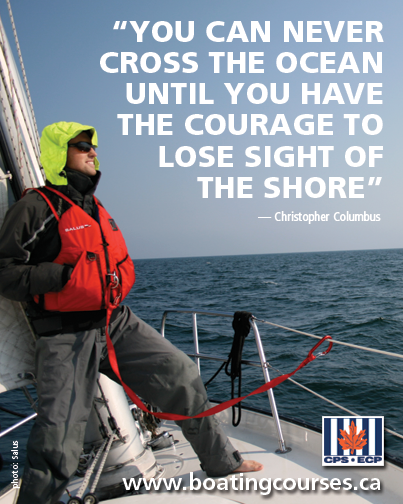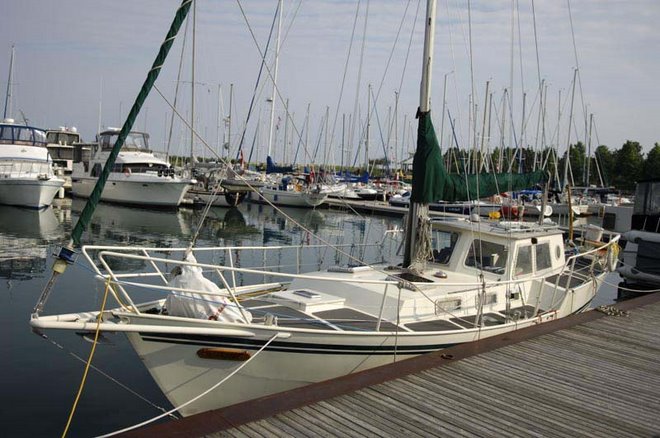This little gem was found on the Canadian Yachting Facebook page. Scroll down to the "Feb. 26" entry. Props to fellow Ontario sailor Scott B. and anything-sailing.com for spotting it.
 |
| Spot the problem: It's not the missing sea boots, nor the suspicious-looking angle of heel. |
In the context of the sea, recreational sailors face the same challenges as professional mariners who receive mandatory education on how to deal with dangerous situations aboard ships. We learn the same techniques and attempt to master similar methods of evaluation through education, and through the development of the awareness necessary to stay safe at sea.
Such education iss mandatory in such countries as Portugal, where the Portuguese Navy is the coast guard and the entire coast is more or less a rough and potentially dangerous lee shore. In North America, we have either "nothing" or feeble, low-bar certifications like the Canadian PCOC, which exposes the new boater to about enough instructional rigour to manage a figure-8 on a mill pond in a Torqeedo-powered Zodiac.
The conscientious recreational boater, perhaps being informed by circumstance of his or her knowledge deficits by the indifferent elements, or possessing insufficient comprehension about how a boat actually works, has a few options. In Canada, there is Canadian Power and Sail Squadrons, a longstanding and largely volunteer-run organization that has a noble mission statement:
To increase awareness and knowledge of safe boating by educating and training members and the general public, by fostering fellowship among members, and by establishing partnerships and alliances with organizations and agencies interested in boating.-CPS mission statement.
And good on them for that. I took with veteran cruisers Ken and Lynn (it's where we all actually met) the 12-week Boating Course in 1999, about four months after I bought Valiente and after an episode of pure and expensive ignorance persuaded me that I had a serious shortfall in knowing how to work my new-to-me boat. The course was not particularly easy, and all of us felt, after a longish exam at the end, that we had earned our then-freshly introduced PCOC certifications, and that we now had some sort of theoretical foundation to our actions and decisions on the water. I have found their standards have declined in this regard in the intervening years, along with the ease with which a PCOC can be obtained.
Nonetheless, I went on, as did my wife, to take other CPS courses, such as Radio Operation, Coastal Pilotage, Basic Marine First Aid and a few others, like Celestial Navigation. There haven't been many long and cold Toronto haulout seasons during which I haven't taken some sort of education that has been intended into increasing my seamanship and general on-board competence. I leave it to Neptune and other sailors to judge how that's panned out.
I've often spoken here about recognizing risks at sea. We learn to evaluate risk through experience, but in many situations, the acquisition of "risky experience" can damage the boat, or injure or even kill the crew. So we take courses to explore risks and safety at sea in a methodical and cosseted fashion, in the hopes that "the right or at least the best answer" will occur to us should the worst case or the riskiest choice manifest on a boat on which we are crewing or which is under our command.
The way individual minds are put together, and the level of one's susceptability to panic or fear will, of course, play a role in whether the training one takes in a warm classroom on shore will serve a frozen crew in a damaging gale. There's clearly limits to education. But (and we are now returning to the gloriously bad bit of advertising above), one of those limits should not be, in my view, promoting an organization's boater education courses with the opposite of what is the correct use of a safety device and technique.
 |
| None of whom are now alive, but hey. |
The contemplative cabin boy pictured above on what may be a Nonsuch would find just about enough deflection in that lifeline to drown were the improperly deployed tether he's sporting to be used for real. Not only is that the wrong way to rig a tether, it's a way to rig a tether that would most likely kill the user. Were you to lash a baby seat with jute twine to the outside of a car windshield in order to demonstrate the efficacy of your in-dash airbags during a head-on collision, a similar level of utility would be on show.
TETHERS DON'T WORK THAT WAY. THEY WORK THIS WAY.
And that's why I now take RYA courses, despite my current inability to actually pass the things, instead of CPS. There's simply a higher grade of care and professionalism at work. All the good intentions in the world (and CPS is full of people with good intentions) can't make me forgive or forget that this educational organization approved and presumably paid for that advertisement to go live. If they are careless about this, which must have passed in front of many sailorly eyes, how much confidence can one have in the quality of their educational courses?
As an aside, I could let the Christopher Columbus quote pass, even though I and some others consider him a bloodthirsty slaver, but not a tether used in exactly the wrong way, even in a clearly faked-up, fair-weather photo shoot.
Wonder where I learned that? Probably when the ocean tried to kill me and only a properly rigged tether stopped it so I could live to rant another day.





4 comments:
Four years ago, I took the CPS's advanced navigation for about 6 evenings and dropped out, it was irrelevant to my world. With the CPS, the skipper ends up at the chart table almost full-time and has no time to be on deck, which is where things are happening. At that time, they still ignored GPS systems in their entirety, even as an adjunct to navigation.
In addition, the CPS''s biggest drawback is that they don't offer any on-the-water courses. How can that be? How could anyone learn to sail and navigate with only a textbook? I say it's impossible, that's for sofa sailors.
The RYA's curriculum has theory classes but most of its courses are on the water. In addition, it is the only yachting organisation that provides professional certifications as an agent of the Maritime and Coastguard Agency. Sail Canada, US Sailing, ASA do not. There is IYT in Florida, but compared to the RYA, it's a small school that has yet to get a significant international recognition.
The mandatory courses in Portugal are also a bit heavy on theory rather than practise.
I think they assume that Portuguese men are all related to Vasco da Gama and thus genetically engineered to be seamen...much like Portuguese water dogs.
Either way, you get plenty warnings about your options: do it right or die. But then, sadly, anybody living near the coast knows about so many boating-related disasters - most of which involving fishing boats - that even the alpha macho men have a huge respect for the mercilless power of the ocean.
Considering my oldest and still functional GPS dates to 1999 (it's a Raymarine 420 on Alchemy,), I find that shocking. I suspect the baseline prejudice in favour of "traditional navigation", which amounts to coastal pilotage for most recreational sailors arises from a desire to teach those concepts that allow the sailor to question...or at least not to have a childlike faith in...what the GPS is reporting. Either that or it's because most CPS courses are taught by older sailors who are not comfortable with, or feel they don't need, GPS.
Needless to say, this is short-sighted. I know CN, pilotage and how to use a GPS with or without a plotter, but it all feeds into having a sense of where I should be and what I should be seeing. To get to that holistic stage of navigation, you must spend hours at the helm outside of your home waters, and that's not what CPS provides.
So I'm with you in that the theory, as is the case with RYA courses, must be integrated with the practice, which means wind, rain and low visibility (well, some days. Or nights.)
Horatio, thanks for commenting. You've reminded me that I once touched the tomb of old Vasco himself, for luck and because I am not entirely immune from marine superstitions.
I do in fact take comfort from the utter indifference of the sea to my well-being. Everything I do to keep myself, my crew and my boat afloat is up to me.
I know that some find this nihilistic or perhaps even atheistic, but if the sea will kill me "without a thought", my level of macho or my feelings on how unjust the situation of drowning may be will not make a drop of difference.
Preparedness, on the other hand, may. That's why I really believe in education and practice. My crew are in for some surprises with this year's crew-overboard practice...we are going to do it RYA-style. Thanks for commenting.
Post a Comment